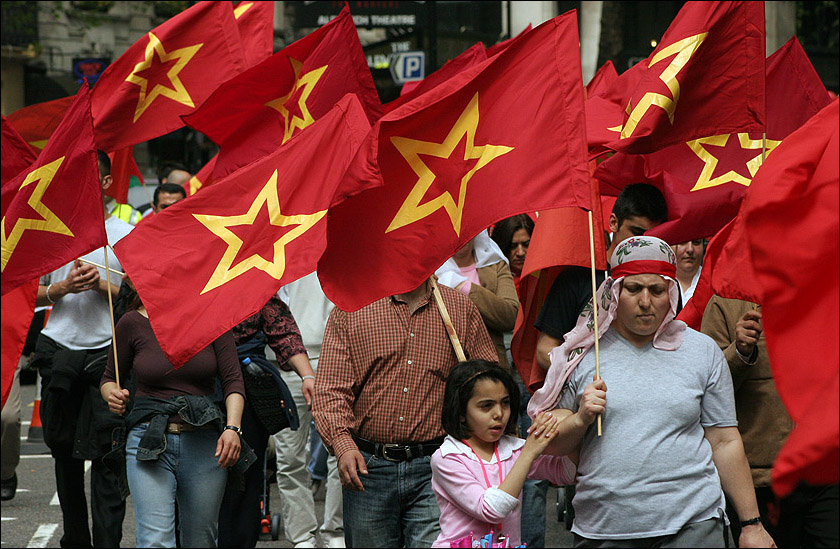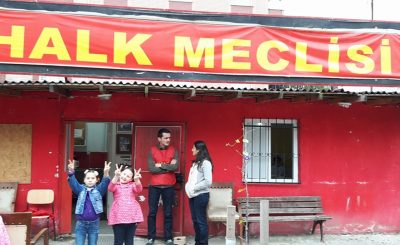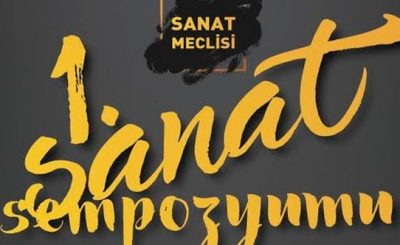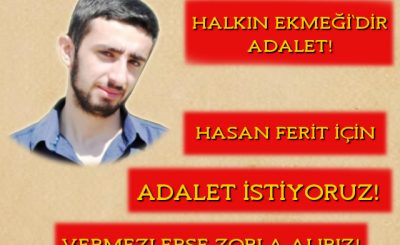Susurluk shook the fascist Turkish state to its very foundations. The reality of the Turkish state, the face of the contra-guerrillas, whose mask had been gradually exposed by revolutionaries over a period of decades – this was revealed to everyone in a moment by the accident. All attempts by the bourgeois parties, which are up to their necks in filth, all attempts by the oligarchy and the monopolies to sweep Susurluk under the carpet, or to stabilise the system by offering up as sacrifices some of those whose guilt was all too obvious – all these came to nothing. Because of Susurluk, the people lost faith in the credibility of its rulers.
This is no reason to lean back and wait for the inevitable collapse of the system. It is no secret that the Turkish state is able to overcome the Susurluk crisis. The methods which it has at its disposal to do this take many forms. Using discussion of the case in the media, it pretends to have resolved the crisis. The people are to be given the impression that there are honest and sincere forces in our country equipped with expertise who are dealing with the matter. The media are also used to push other events into the foreground in order to shove Susurluk into the background and make people forget about it as much as possible. Artificial conflicts are placed on the agenda. In order to hide the face of the contra-guerrillas once more, and into the bargain to pose as the only force capable of saving the state, and seeking also to discipline the bourgeois parties, the military declared that the “secular state is in crisis”. The threat of a coup to save the “Kemalist basis” of the state from encroaching Islamicization also played its part in diverting the attention of the people from reality. The revolutionaries must not allow the protests by the people, which following Susurluk rose to levels never previously reached, to ebb away again. On the contrary, the task of uniting the people’s protests and directing them towards a common target is more urgent than ever before. Only revolution can remove the filth of Susurluk. Consciousness of this must be spread among the people. At the same time, the revolutionaries must undertake the task of organising the people in the struggle for this revolution.
To carry out these tasks, the revolutionaries must not copy the strategy and tactics of revolutions of the past. Today it is not possible to lead the struggle by resting it upon the ideology and tactics of various socialist countries and imitating their policies. But the left in our country has forgotten its roots to such an extent that it is developing strategy and tactics that attempt to capitalise on the conflicts within the ruling class and to form alliances with them. Their attitude is determined by pragmatism alone. Supposedly there are many people in intellectual and left-wing circles who know the methods of disinformation and psychological warfare used by the contra-guerrillas. They have written countless sheets of paper on this subject but this apparent knowledge is not reflected in the actual struggle. The standpoint of the revolutionaries must remain clear. If our attitude to the enemy is not focused, if we do not make it clear who is a friend and who is an enemy, then our assessments of the enemy’s actions will turn out to be false.
Organising the people for the struggle must be made into a reality among the people and with confidence in the people. Only a people’s revolution, a revolution which carries the people’s demands on its banner, is capable of establishing people’s power. Only a revolution can clear the garbage away. Only a revolution can make Turkey into an independent and democratic country. Only through revolution can the Kurdish people’s right to self-determination be realised. These slogans describe the people’s demands and show how they can be achieved. These demands are the demands of people in Turkey, whether they are Kurds, Turks, Laz, Cherkess, Arabs, Georgians, Alevi or Sunni, people of all ethnic groups and religious backgrounds in Turkey. The struggle for these demands means uniting and organising the people and leading it in the fight against the contra-guerrilla state of Turkey, in the struggle to set up revolutionary people’s power.
Susurluk has shown that despite all splits among the left-wing, revolutionary and democratic forces, despite a false and pragmatic attitude and inadequate activities, a potential for resistance among the people has developed which must be taken seriously. It is possible to organise this potential against the rulers, by uniting it and ridding it of its unplanned nature. But if this is not taken seriously and discussed properly, if everybody acts according to his or her individual whim, if we do not work out our sense of collective consciousness and develop discipline, we will not be able to achieve any results that can be taken seriously. The enemy will try to sabotage any efforts towards unity. We must show in practice how to attain this unity and win the trust of the masses. From this point of view, whether we stand together or not when under attack by the enemy is a matter of particular importance. Programmes for unity which remain on paper and are not put into practice and do not mobilise the masses will lead to nothing.
It is the task of revolutionaries to expand both the war and the organisation of the people in all areas. The armed struggle and the guerrillas are of strategic importance in this. The armed struggle is the guarantee of the people’s future and power. We must never lose sight of this strategic perspective. If we do not increase the scale of the people’s armed forces, step by step, we will find it impossible in the long term to broaden and make secure the people’s organisations. On the other hand, the broadest forces of the people’s opposition must be united and organised.
It was from this perspective that the people’s councils were set up, on the initiative of the DHKP-C. The people’s councils are forms of organisation in which the people themselves, with regard to the problems of everyday life, develop ways and means to live together, irrespective of nation, nationality and beliefs. In these people’s councils the revolutionaries absolutely must occupy their place. Their aim must be to increase the scope of the people’s councils, to institutionalise them and to direct them against the system. These people’s councils must not be structures in which the “failings” of the Turkish state are removed through “self-help”. Far more, those who are responsible for the lack of an infrastructure, water, inadequate education systems and so on, those who are responsible for poverty, exploitation and oppression must be named and accused. Poverty, exploitation and oppression will be removed neither by sending petitions to the rulers, nor can “self-help” deal with the “inadequacies” of the state. The revolutionaries know that only revolution can sweep this rubbish away, and that problems can only be solved by smashing the system and setting up revolutionary people’s power. Every right, every small improvement in the people’s living conditions will have to be wrung from the imperialists and the Turkish collaborationist oligarchy through hard struggle. A democratic, independent Turkey in which there is freedom of opinion and speech, the right to strike and the right of assembly, in which poverty, exploitation and oppression have been abolished, in which people of all nations, nationalities and beliefs, the peoples of Turkey, are brothers and sisters and can live in dignity – this can only be brought about through setting up revolutionary people’s power. None of these rights, people’s power, will simply be given to us, nor can we achieve them peacefully, through reforms. Such a Turkey must be won through the struggle against the rulers. As political structures, the people’s councils must, as organisations of this struggle, be institutionalised and propagated, this is the task of the revolutionaries. We must set ourselves the task today, that all the people’s forces, no matter what nationality or belief, no matter what profession they have, unite and organise in the struggle for revolutionary people’s power under the demand for an independent, democratic Turkey. The people’s councils must be seen from this perspective.
As a result of this development, a draft constitution has been formalated by the DHKP-C. This draft, on the basis of an independent, democratic Turkey, in which the people rule themselves through the people’s council, is the concrete answer to the problems of the people. Solutions to problems of education, infrastructure, accommodation and work will be developed which are sufficient for the people’s needs, the freedom of assembly, thought, belief and the right to strike will be guaranteed, along with the right of a nation to self-determination. Workers, peasants, small-scale producers, small businessmen, youth, women, our people living abroad, people of the Kurdish and Turkish nations, the Cherkess, Arab and Laz nationalities will find suggestions for solutions to their problems in this draft. It was not a matter of putting together a good constitution on paper. A few wordsmiths and experts in constitutional law could do as much. The chief aim was also not one of collecting the people’s views and suggestions and putting them on paper. Of course that will be done. To put it more accurately, at the end of this work such a result will arise naturally. But this was only an objective, and not the most important one. We approach our chief aim more closely if we ask ourselves what we want to achieve by proposing a constitution and by campaigning, what we expect and what result we desire. The answer to these questions must be clear to every member of the Front who takes part in the campaign and discusses the draft with the masses. Today the Front’s claim to seize power is greater than ever before. It is a force that represents an alternative to the current system. This is the result of the struggle which has been going on for decades, in which hundreds of its people fell, in which it paid a high price and created a tradition. The draft of this constitution is not an academic game confined to paper, but the result of our persistence on the path of revolution. We say we will carry out the revolution and make the constitution a reality.
The constitution is a stepping stone on the path to seizing power. It is simultaneously a programme for revolutionary people’s power as well as a programme of the Front, the programme of the revolution.
The revolutionary people’s power will be the revolutionary power of the people. The burning question on the agenda in Turkey is the formation of revolutionary people’s power in a united front of workers, civil servants, peasants, small-scale producers and small businessmen, with intellectuals and artists. An anti-imperialist, anti-oligarchic revolution of the people. This is a reality which is outside our subjective influence and our subjective intentions and is determined by the socio-economic and class structure of our country.
The revolution will be carried out and revolutionary people’s power will be established under demands for an “independent, democratic state, a state in which nations and peoples are free, in which work, justice and the inviolability of human dignity count as the highest virtues, a state in which the people themselves rule”, or to put it briefly, it will be under the demands in the draft constitution of the people’s united forces.




